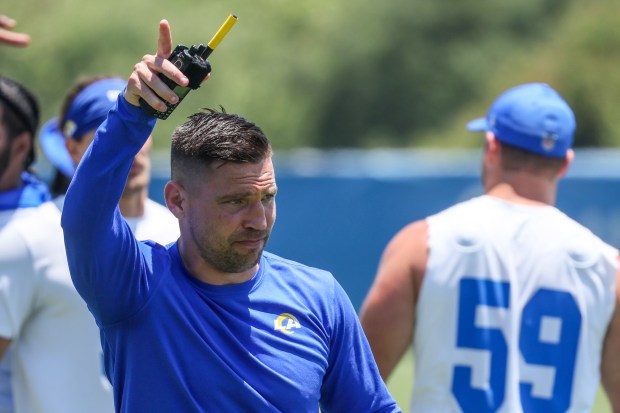THOUSAND OAKS, Calif. — It’s not that he was embarrassed. He wasn’t trying to hide who he was. This was just easier.
The more he started to pour himself into the sport, first as a player, then as a young coach, the more he started to notice that he was introducing himself differently. “Hi, I’m Chris Shula” became “Hi, I’m Chris.”
“I almost didn’t want to tell anybody,” he admits now. “I wouldn’t necessarily lie about it, but I wouldn’t be open about it, either.”
He knew the looks he would get when they figured it out, how heads would tilt back and eyebrows would jump and conversations would change.
Shula, as in …?
They would see him differently. Treat him differently. They would assume his path was already paved, that he wouldn’t have to earn it, same as everybody else. He resented that. He wanted to earn it, same as everybody else.
But that surname carried something with it, especially in the city where he grew up, where the Miami Dolphins still drive to work every day on Don Shula Drive.
Imagine playing high school football 12 miles from where your grandfather retired as the winningest coach in NFL history. Imagine trying to climb the coaching ladder without everyone assuming that you had every job handed to you because your grandpa knew so and so.
“I never wanted to break into this business because of my last name,” the 38-year-old Shula insists.
So he didn’t. He started out in Muncie, Ind., then coached Division III in Northeast Ohio. He worked as a grunt in quality control, then learned to coach every position on defense. And when he got the phone call last winter telling him he had landed the biggest promotion of his career — defensive coordinator for the Los Angeles Rams — he couldn’t help but smile.
He was standing in Concourse D at Miami International Airport, looking for a bite to eat, right in front of a Shula’s Steakhouse.
He went in. Sat down. Ordered a burger and a beer. He had earned his shot, he told himself, without skipping any steps along the way. Now it was time to see if he deserved it.
The first game of the season, in Detroit, the Rams’ untested young defense held its own for four quarters against a Super Bowl contender before fading in overtime. Shula left encouraged. It was a solid first step.
Then they went to the desert and got shellacked.
“Oh, my gosh,” Shula thought to himself, jogging off the field in Arizona after a 31-point loss to the Cardinals in Week 2. “What just happened?”
His unit had been gashed. Embarrassed. It was an early lesson for Shula and a humbling one at that: One game does not carry over to the next.
While he steamed over the performance — primarily the 231 rushing yards allowed — it hit him: This could get bad, and quickly. “You look up and you’ve got the 49ers coming in the next week, and you’re already 0-2,” he says.
It was nearly 0-3, but the Rams ripped off 13 straight in the fourth quarter to steal a 27-24 win over San Francisco. Then came losses to Chicago and Green Bay, dropping the Rams to 1-4. Suddenly, the Rams were among the biggest disappointments in the league, and their first-year coordinator was off to a stumbling start.
A week later, Shula stood on the field before a game against the Las Vegas Raiders, making small talk with a few Las Vegas assistants. “They were 2-4 and we were 1-4,” he says. “So it’s, ‘How you doing?’ ‘Good?’ ‘Good.’ But what we’re all thinking is: We have to win this one.”
The Rams did, 20-15. Shula got a game ball afterward. His players mobbed him in the locker room.
“Every streak starts at one!” he shouted.
The humbling moments of the season’s first month have hardened the Rams. Even with a record of just 5-6, they are very much in the thick of it in the NFC West.
And Shula is starting to show that he’s not in over his head.
“Dive full on into the preparation,” his boss and old college teammate, Sean McVay, always tells him. “And don’t be afraid to get your heart broken.”
Dave Shula, Chris’ dad, always knew that Chris was going to end up being a coach.
At 5 years old, Chris was peppering his grandpa for stories about Johnny Unitas. During backyard football games, Chris was the one picking the teams and enforcing the rules.
Dad coached too. Chris would tag along with him to training camp every summer. Miami. Dallas. Cincinnati. He would clean the locker room and set cones on the field and hang with the players after practice.
“I’m telling you, he pretty much learned to read by going through the sports pages of the Miami Herald and Cincinnati Enquirer,” Dave says.
Football was life. He was a Shula.
It started with the patriarch: Don Shula was a head coach at 33, at the time the youngest in NFL history. Thirty-two years later, he retired as the gold standard: three championships and more wins — 347 — than anyone in history.
Dave worked for his dad in Miami, was Jimmy Johnson’s first offensive coordinator with the Dallas Cowboys, then was the Cincinnati Bengals’ coach from 1992 to 1996. Don’s youngest son, Mike, has been at it for 36 years, bouncing between college and the pros.
Chris was asking his grandpa for pointers at age 8.
“Practice it until it’s perfect,” he remembers hearing. “And remember, the game doesn’t change. You’ve always got to block. You’ve always got to tackle.”
Chris grew into a star linebacker in high school, good enough to land a scholarship to Miami (Ohio), where he met McVay, a fiery wide receiver with a tuft of blond hair who became one of his best friends.
After graduation, McVay latched on as a low-level assistant on Jon Gruden’s staff in Tampa. Chris wavered. Coaching had always intrigued him, but part of him resisted — he knew what people would say. He didn’t want any handouts. He didn’t want to follow some preordained path.
He was going to do his own thing. So he landed at the University of Oklahoma, where he started work on his master’s degree. The plan was to become an athletic director.
But Saturdays stung. During Sooners games, he would be up in the suites, schmoozing with season-ticket holders. “It wasn’t me,” he says.
He missed the grass. Missed the competition. He realized he belonged on the field, and he didn’t care about the assumptions that would come his way, the cries of nepotism.
Chris Shula was going to coach.
Chris started out as an assistant linebackers coach at Ball State, a job he got after his own defensive coordinator at Miami asked him to interview. Three years later, he was the defensive coordinator at John Carroll in Division III when his phone buzzed on a recruiting trip. It was Craig Aukerman, his position coach in college, who was now with the San Diego Chargers. They had a quality control job open, the lowest-level spot on the staff. Was he interested?
Shula was on a flight the next day.
Two years later, McVay became the youngest head coach in modern NFL history and asked his old college teammate to join his staff. Shula spent the next seven seasons bouncing between roles, soaking in the schemes of Wade Phillips, Brandon Staley and Raheem Morris, the Rams’ previous defensive coordinators under McVay.
He coached the linebackers, then the defensive backs. He was the passing game coordinator one year, then the pass rush coordinator the next. It was as if McVay wanted him to build expertise at every level of the defense.
Then, in January, Morris landed the Atlanta Falcons’ coaching job. Shula waited. He was in Miami, visiting his parents, waiting for word from McVay. The call didn’t come for a few hours.
Finally: “We’re going to interview you.”
When the job was his, Shula faced the prospect of replacing Aaron Donald, one of the best defensive players in league history, who retired at the end of last season.
Rams general manager Les Snead stockpiled his defensive front with young talent, then tasked Shula with coaching them up: Six members of the Rams’ front seven are either rookies or are in their second year. The early returns were disastrous. Five weeks into the season, the Rams were last against the run, last in yards per play and last in defensive expected points added.
Shula kept working, kept teaching. Dive full on into the preparation, and don’t be afraid to get your heart broken. He sought out his unit’s deficiencies, then attacked them in practice. “He understands the conflicts every position has,” fourth-year linebacker Michael Hoecht says. “He understands where the stresses are.”
Shula isn’t shying away from his aspirations. “I think it’s every coach’s goal to become a head coach one day,” he says. “But it’s not something I think about often. When the time comes, the time comes.”
For now, the aim is another NFC West title and another trip to the playoffs. After a dreadful start for the Rams’ young defense, a third-generation coach carrying on one of the league’s weightiest legacies has started to prove his mettle. On his own terms.
“You know,” Snead said, standing on the sideline late in training camp, weighing his new coordinator’s path to this point, “I never think of him as a Shula.”
Which is how Chris always wanted it.
This article originally appeared in The New York Times





